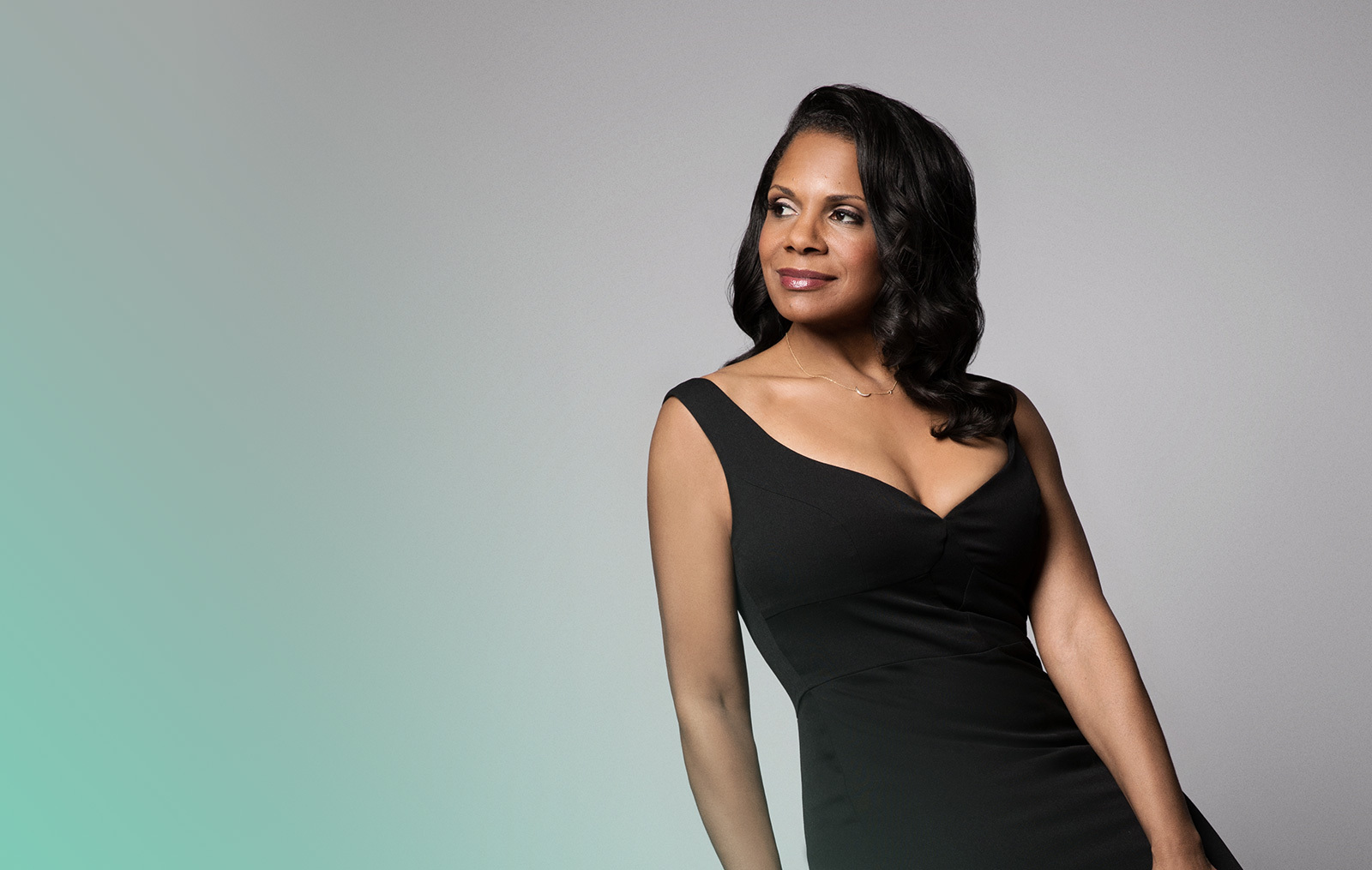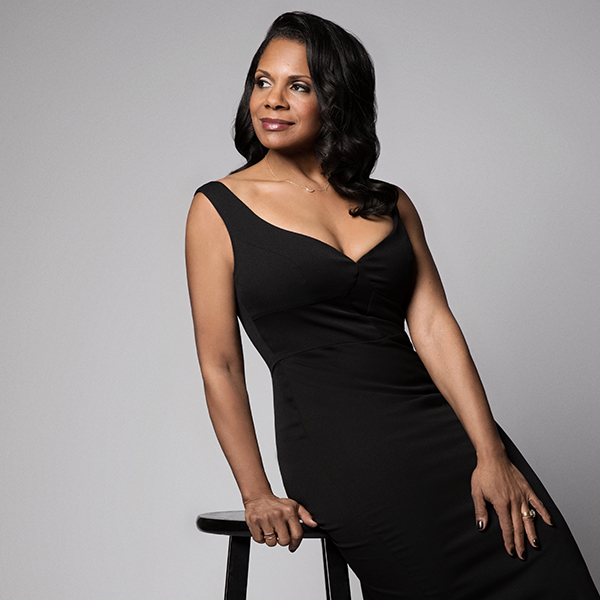September 05, 2023
Queen of song
by Roger Pines
A six-time Tony Award-winner for her roles on Broadway, Audra McDonald is equally celebrated for orchestral concerts, which she has performed to huge international acclaim. Ahead of her eagerly awaited first appearance at the Lyric Opera House, McDonald spoke with Lyric’s former dramaturg about her voice, her artistry, and how she prepares her concert programs.
What are you most looking forward to in this concert?
I love Chicago! I’ve never performed at Lyric, but I look forward to getting to know the audience.
You’ll be appearing with Lyric’s orchestra; do you remember your first time performing with such a large group?
I was doing Anything Goes at my high school, playing Reno Sweeney [the show’s leading role], and we had the high-school orchestra. Performing with an orchestra feels something like flying. You’re being supported by the most incredible updraft in the world, and you continue to soar higher and higher.
How did you get started performing orchestra concerts?
The first person who reached out to me for concert work was Michael Tilson Thomas, who said, “I’d like you to come sing with the San Francisco Symphony.” It was 1997 or 1998.
You have sometimes been called a lyric soprano. Is that what you consider yourself?
I think so. My longtime voice teacher, Arthur Levy, says, “Your voice strikes me as a soprano with a bottom extension.”

Audra McDonald
How conscious are you of technique when you’re singing?
I don’t think I’m ever not considering technique! One way I look at it is that a dancer always does a “barre” to warm up, whether you’re doing tap, jazz, modern, or ballet — you still have that foundation of technique. I’m most interested, and my vocal coach is most interested, in ensuring that the entire instrument is warmed up and operational. When I was doing Billie Holiday [in Lady Day at Emerson’s Bar and Grill], he’d warm me up all the way to a high C, to make sure I had that, and then all the way down. So my voice was in optimum shape to do what I needed to do with it.
You’ve always had amazingly clear and meaningful projection of text. Is that something you have particularly worked on?
I idolize Judy Garland and Lena Horne, and what they did with a text. I had the great fortune to do several concerts with Barbara Cook. After admiring her and knowing her work from afar, I was seeing her work up close! As I was auditioning for certain roles, or preparing for concerts, I’ve had coaches, mentors, and friends who helped me put the music together, or let me perform it for them, before I performed it in public. They were able to help me get as close as possible to the specificity of the text, and the meaning and the emotion coming from the text.
When I was at Juilliard and living more in the classical world, my focus on the text was a problem I would run into. I remember being given Despina’s aria “In uomini, in soldati” from Cosi fan tutte. There’s that one part, when she’s singing, “sperare fedeltà” [“to hope for fidelity”]. She laughs, because it’s a hilarious thought: “Please! Soldiers and men will be faithful? Come on!” I knew she was a lusty, smart, earthy maid, so I busted out with this really hearty, loud laugh that seemed right for the character. I remember being absolutely admonished and hushed by my coach: “No, no, no, that’s not good for the voice!” They gave me an example of what the laugh should be [she imitates a girlish, typical light-soprano laugh]. I said, “Why would it be that? That’s refined. She’s talking about whether men will cheat on you — that isn’t a refined moment.”
Back then, people might have said, “Audra is never going to make it!” I was always going to sacrifice the sound for the intention.
How do you choose your repertoire for the concerts?
It’s a gut feeling with any song. I know within two seconds that I want to sing it. It’s very instinctual for me, always. There’s something in me that responds in a primal way to the song. It’s usually a marriage of text and what the music is doing. The two come together in a way that’s meaningful to me, deep down in my soul. Ask Andy Einhorn, my music director all these years, who will be conducting this concert. The program will be chosen and put together very carefully, just as someone cooking an entire meal would want the dishes served at the right time — you don’t want to serve your dessert before your entrée! When Andy and I put a program together, we think about the type of audience that will be there, and what might appeal to them, but first and foremost, what will appeal to us.
2014 Tony Awards Show Clip: Lady Day at Emerson's Bar & Grill
Audra McDonald in Lady Day at Emerson's Bar & Grill
After you’ve performed a song for a period of time, do you ever start to hear things in it that you hadn’t before?
That happens with maturation. With life experience. There are certain songs in my concert right now, including a song I knew as a child. It’s a children’s song that has taken on a whole new meaning for me. The way I sang it as a kid vs. the way I approach it as an adult — what comes up for me emotionally is completely different.
Can you share the name of the song?
“It’s Not Easy Being Green” [by Joe Raposo, written for Sesame Street].
You probably have countless admirers who hope every concert will include highlights from your musical theater roles. Is it important to you to include that repertoire?
It’s not a big priority in my programs. In fact, I rarely do songs from my roles. I do sing “Summertime,” and every once in a while I’ll bring out “Mr. Snow” [from Carousel]. With Lady Day, that would mean my having to approximate Billie Holiday’s voice, which feels odd to do in a concert setting. I have a few albums out, and sometimes people have favorites from those albums, and those I tend to include.
The audience is of course hugely important in your concerts. What do you get from them that you don’t get from a Broadway audience?
There’s no fourth wall in a concert setting. That’s the biggest thing: I can acknowledge that they’re there! Two shows on Broadway — Lady Day and Ohio State Murders — are the only times where my character addressed the audience. That’s the biggest difference with concerts — I am singing to them.
Do you speak to the audience as well?
I have ideas that I talk about between songs. It’s not scripted, and it changes from city to city. I’m not shy about telling the audience what it was like to get to that city. When I did a concert in the Grand Tetons, we got onstage, did our first number, and then it was, “We weren’t sure about getting here. What’s up with the bumpy weather?” I want the audience to feel like they’re in my living room and we’re going to have an evening together. “An Evening with Audra McDonald” — I take that quite literally. We’re going to share. There’s going to be a communion between me, the musicians, and the audience. I want them to have a more intimate knowledge of who I am.

